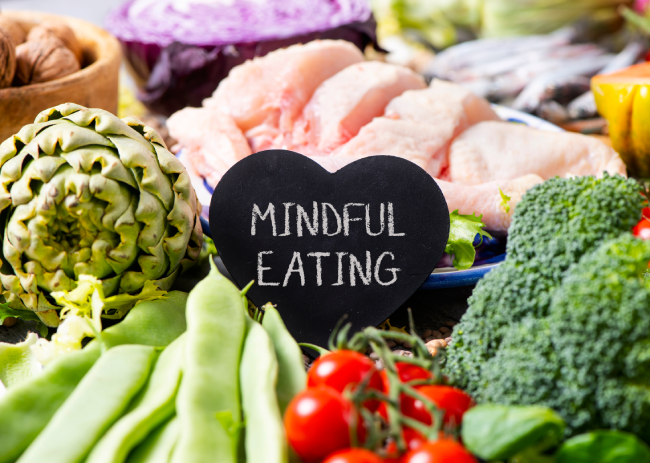Many believe that addiction recovery is nothing but recovering from substance abuse. However, that’s such a simplistic point of view. Recovering from addiction is, more than anything, recovery from a lifestyle full of neglect. After all, addicts are commonly more concerned about where their next fix will come from than they are about, let’s say, a balanced diet. As a result, their bodies are often deprived of essential nutrients. Those who have decided to turn on a new life have a long road ahead. One will include saying goodbye to negative habits and adopting positive ones instead. And what better way to start than by incorporating a nutritious diet? Besides, the power of mindful eating in addiction recovery is more significant than you may think.
What Constitutes Mindful Eating?
Before getting into the nitty-gritty details of mindful eating in addiction recovery, let’s dive deeper into the concept. The foundation of mindful eating lies in the Buddhist practice of mindfulness — a meditation that teaches you to pay attention to and manage your internal experiences. It is used to treat a wide range of problems, ranging from eating disorders, and mental health issues, to addiction. Now, regarding mindful eating, its primary goal is to focus one’s full awareness on their eating experience, desires, and bodily cues. To paint a better picture, let’s say it revolves around:
- Slow, undisturbed eating;
- Recognizing hunger cues and stopping to eat when you feel full;
- Identifying real hunger;
- Using your senses to their full potential to take in the appearance, smell, texture, and flavor of the food;
- Learning to manage food-related stress;
- Adopting healthy eating habits;
- Becoming aware of how food affects your psyche;
- Feeling thankful for the food you have.
Why Is Mindless Eating Dangerous?
Individuals’ approach to food is primarily driven by habit energy, which significantly contributes to their tendency to overeat. It’s common for people to go through entire meals without registering much of the food’s flavor, which especially applies to comfort eating, aka eating as a result of experiencing emotional difficulty.
Furthermore, as we live in a busy world, people are prone to multitasking while eating — a prime example is eating in front of a TV. Those who eat without paying attention to what they are doing miss bodily cues that tell them they are full. That means that even if they have eaten enough to satisfy their physical hunger, their minds still believe the body needs more fuel.
Returning to comfort eating is prevalent in those recovering from addiction. The practice itself doesn’t differ much from addiction. Why? Well, because both are a form of emotional avoidance.
Comfort meals are typically full of fat, sugar, and salt. They tend to increase dopamine levels in the brain, creating a fleeting sense of satisfaction and pleasure. That’s precisely the reason why addicts are drawn to such food! And while the ”high” is only temporary, such an eating pattern leads to lasting damage that can have disastrous consequences. Those that engage in this behavior regularly are at higher risk of becoming overweight and ill. As a result, they are likely to enter a vicious cycle of comfort eating to numb the pain.
How to Practice Mindful Eating In Addiction Recovery?
Working with a nutritionist is crucial to establishing good eating habits and routines in the early phases of addiction recovery. As part of their therapy, many recovery facilities have patients participate in a nutrition program that introduces them to the fundamentals of mindful eating. However, recovery is a long process that doesn’t end when you leave the rehab facility. With that in mind, we bring you several methods for practicing mindful eating. You can use each one to mend your relationship with food once you return home.
#1. Schedule Time to Plan Your Meals
You’ve come home exhausted, only to realize you must make dinner. You don’t know what to make, so you look up a recipe and sprint to the supermarket to get the necessary ingredients. You come home and begin cooking while stressing over simply wanting to finish everything so you can finally eat. Finally, you give in and order takeout. Sounds similar?
If only you were to plan your meals a week ahead. That way, you wouldn’t have the added stress of worrying about what to eat. Planning meals for the whole week sounds like a lot of work. But however silly it may sound, doing so will save you time and effort. For maximum efficiency, we suggest you spend some time during the weekend making a plan for the week. Also, do your best to purchase the necessary supplies before the week begins. As a bonus, with the carefully chosen food already in your fridge, you’ll have no excuse for eating meals that were hastily thrown together.
#2. When Meal Planning, Take Leftovers and Snacks Into Consideration
Making extra food in advance ensures you won’t have to spend more time, money, or effort than necessary to enjoy a satisfying meal. Even if you don’t have enough leftovers for a full meal, you might have enough to add to an omelet or toss on top of a salad. Furthermore, having a few nutritious snacks on hand also prevents you from putting together (or purchasing) an unhealthy meal when experiencing an out-of-the-blue blood sugar dip.
Healthy snacking encourages mindful eating throughout the day and helps you establish a connection with your body. When your stomach grumbles, that’s it attempting to communicate with you. So, when it tells you to refuel, pay attention to its rhythms and learn to trust them.
Feel famished mid-cooking? There’s nothing wrong with taking a healthy snack. After all, by eating one, you’ll be giving yourself a chance to enjoy the cooking process rather than dread it due to hunger cues.
#3. Experience Food With All Your Senses
Take your time to enjoy what is in front of you. Try to feel it with each of your five senses. Shut your eyes and enjoy your meal’s aroma, flavor, and texture. That is the core of mindful eating. Before you eat, express a few words of gratitude for the food on your plate. If you’re not a fan of grace, take a moment to reflect on how it came to be there. Consider how everything in the cosmos interacted to create that pile of vegetables: the soil, the sun, the rain, the farmer, etc.
For mindful eating in addiction recovery to have an even more significant impact, consider growing some food yourself. However, if that isn’t on the table, shopping at a local farmer’s market and eating according to the growing seasons will do enough.
Sarah Pierce has recovered from addiction thanks to Harmony Ridge Recovery Center professionals. Nowadays, she’s working as a freelance writer and is dedicated to making every moment in her life count. She spends most of her free time discovering the wonders of nature and cooking world-class delicacies!

